STP Questions
Here you will find answers to STP Questions
If you are not sure about STP, please read my Spanning Tree Protocol tutorial first.
Question 1
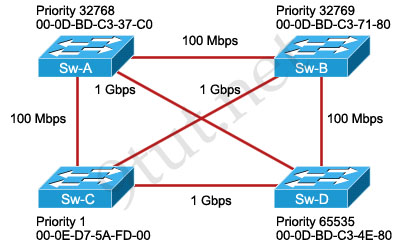
Which switch will be chosen as root bridge and why?
A. Sw-B, because it has the highest MAC address
B. Sw-A, because it has the lowest MAC address
C. Sw-C, because it has the lowest priority
D. Sw-D, because it has the highest priority
Answer: C
Explanation
The bridge with the lowest bridge ID will become the root bridge. The bridge ID = Priority + MAC so the lowest priority will be chosen first. If all switches’ priorities all equal then their MAC will be compared (the lowest is the best).
Question 2
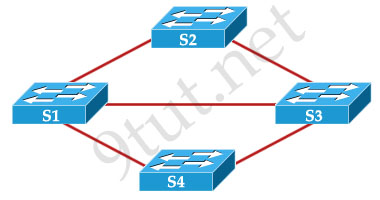
Spanning Tree Protocol has created a loop-free logical topology in the network that is pictured. How many ports have been placed in the blocking mode?
A. two
B. none
C. three
D. one
E. four
Answer: A
Explanation
The best way to solve this question is to suppose that one of these switches is the root switch (bridge). For example, if we choose S2 the root bridge and all of its ports will be in forwarding state (so that they are not blocked).
Also suppose that S1 has higher priority than S3 -> the port on S3 connected to S1 will be blocked.
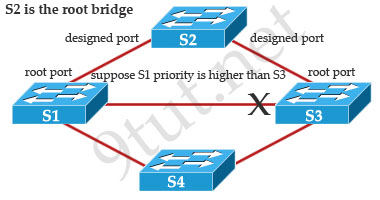
The most difficult problem is that how can we know which port on S4 will be in blocking state. Well, it depends on the Sending Port ID on S4 (Port ID = port priority + port index). If using default values, the default port priority’s value is the same, so S4 will compare port index values, which are unique to each port on the switch. One more time, we suppose S4 connects to S1 via Fa0/1 and S4 connects to S3 via Fa0/2. Because Fa0/2 is inferior to Fa0/1, S4 will select the port connected with Fa0/1 as its root port and block the other port.
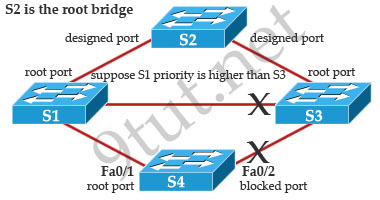
Question 3

What is the way that Spanning Tree Protocol prevents switching loops based on the exhibit provided?
A. STP shuts down S3 to eliminate the switching loops.
B. STP identifies cables that must be disconnected to eliminate the redundant paths.
C. STP load balances traffic evenly across the redundant links.
D. STP places ports into the blocking state to disable the redundant paths.
E. STP allows the switches to communicate with a router that makes the traffic forwarding decisions.
Answer: D
Question 4
The following network was designed to provide reliability through redundancy.
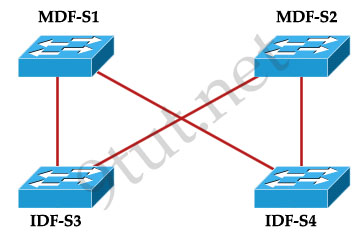
Both of the IDF switches, S3 and S4, are in connection with both of the MDF switches, S1 and S2. A loop-free switching environment is nedded, which configuration scenario will achieve this?
A. Spanning Tree Protocol should be running on all switches.
B. Spanning Tree Protocol should be running only on the root bridge.
C. Spanning Tree Protocol is not needed in this network.
D. Spanning Tree Protocol should be running on only the MDF switches S1 and S2.
Answer: A
Question 5
Which two values are used by Spanning Tree Protocol to elect a root bridge? (Choose two)
A. Amount of RAM
B. Bridge priority
C. IOS version
D. IP address
E. MAC address
F. Speed of the links
Answer: B E
Question 6
Which two of these statements regarding RSTP are correct? (Choose two)
A. RSTP cannot operate with PVST+.
B. RSTP defines new port roles.
C. RSTP defines no new port states.
D. RSTP is a proprietary implementation of IEEE 802.1 D STP.
E. RSTP is compatible with the original IEEE 802.1 D STP.
Answer: B E
Question 7
Which switch would STP choose to become the root bridge in the selection process?
A. 32768: 11-22-33-44-55-66
B. 32768: 22-33-44-55-66-77
C. 32769:11-22-33-44-55-65
D. 32769: 22-33-44-55-66-78
Answer: A


“Also suppose that S1 has higher priority than S3 -> the port on S3 connected to S1 will be blocked.”
So on switches that connect multiple segments, the switch with the +higher+ priority wins?
i thought it was LOWER priority wins…
http://www.ccnacertificationguide.com/Root_Bridge_Election.php
If the cost is the same on a given segment, the port with the lowest bid becomes the designated port. The other port on this segment will be put into the blocking state.
Question 7 is C not A lowest MAC wins
Yes I am an idiot… I see the “8” now.
That is correct, the answer to Question 7 is A because it has the lower priority (32768) – Please read about the election process again.
I think on question 2 you got it backwards, If the switch has a lower priority, then its ports will be in fowarding / root port mode and the inferior higher priority switch will be in blocking mode???
The reason the lower Priority and MAC ID’s win the root election, is to help retain compatibility with older equipment. Older Switches may not support features of newer switches; therefore, some aspects like RSTP on newer switches would disable the network on the older LAN. You would however, lose the ability of RSTP on the newer switches.
I would have thought answer D to question 4 is just as valid as answer A. See: http://www.cisco.com/en/US/tech/tk389/tk689/technologies_tech_note09186a0080890613.shtml
“Note: Switches that do not run STP still forward the bridge protocol data units (BPDUs) that they receive. In this way, the other switches on the VLAN that have a running STP instance can break loops. Therefore, STP must run on enough switches in order to break all the loops in the network. For example, at least one switch on each loop in the VLAN must run STP. You do not need to run STP on all switches in the VLAN. However, if you run STP only on a minimal set of switches, a change to the network can introduce a loop into the network and can result in a broadcast storm.”
If we run STP on just two switches that would be enough to put one port into blocking mode thus breaking the loop??
anyone have any dumps on the fram-relay sim where you map layer to ip address
and also ask about what password you use to access dubi router
four part sim question?
Lost of guys are confused the blocking state of a switch
@PHxAZ it’s:
http://www.9tut.com/ccna-hotspot-questions
On question 2 under the second answer diagram, the Switch 4, Fa0/1 isn’t a root port, is it? Shouldn’t it be a designated port? Or am I wrong.
Disregard previous.
Q1 question: How come that we have “Priority 1” and “65535” in the exhibit in question??
Those values are NOT vlaid values for spanning-tree priority?? The correct values starts from 0 and steps in increments of 4096?? so did I miss anything ?
Can you send me the latest updates, Thank you
@Bruno
Hi! yes – you are missing the Extended System ID, and CISCO per-VLAN STP approach.
As every switch has its VLAN 1 in place this will make its priority 0 + 1 = 1.
In case of 65535 the Extended is disabled making possible to span for the entire pool of 0 – 65535. Some switches wont allow the Extended SysID to be disabled but I think on catalyst 6500 for example, putting a priority on 65535 will make that switch not to be candidate for ROOT Bridge ever.
Regards
Q6 shouldn’t “A” be correct too? RSTP should only be able to support PVRST and MIST right?
@vin
According to Wendell Odem-ICND2, P.88, it says PVST+ does not support RSTP. But a quick google search says they can work together. Is Wendell wrong on this, anyone know?
@Anonymous,
I started hating Wendell Odom when I read the first few chapters of his ICND1/2 books… he is impossible to understand. Read the Todd Lemle book Edition 6th
@Anonymous
yep, try to read for Todd Lammle or Richard Deal.
is this updated?
2 questions can be found in the TestKing software for 640-816.
Passed ICND2 today with 944!! I didn’t have any of these questions on my exam
could you tell me how many questions are from P4S with 204 questions?
@Barry
I find the opposite – I prefer Odams books to Lammles. Quite easy to understand.
I had question 6 today. Passed
Wendell Odom is the best, very easy to understand and straight forward. his book helped me pass ICND1 and will going for ICND2 next two weeks. I have Todd’s books but never liked them.
Hi Guys,
I just passed with 888 – probably could’ve/should’ve been higher. I worked off a brain dump from the leading exam prep guys (I think we all know who I’m referring to!!) but only dipped into this site from time to time.
My recommendation is to know the braindumps inside out but also to know this site inside out(especially the q.s that people say they encountered in the exam). 3 questions that weren’t on the braindump, but were on the exam are to be found on this site – thank god I’d encountered them before because they were Sims and they were quite difficult!!
Also, Cisoc/vue are changing the order of the multiple choice answers – this could cause issues if some one has learned them by order (but who in their right mind would do that!!!!) Just beware of this!!!
Thanks for all the help guys, this is a brilliant resource!!
ccnawhoopwhoop
Hi there could u plz tell us what kind of labs u got ?
I have passes the exam with 944 marks none of them questions came into my exam.
I have got vtp sim and frame-relay sim which is located in 9tut.com under hotspot section but with different names and DLCI numbers
Question 6 was on my exam.
To – ccnawhoopwhoop
could please provide me with the braindump link… im doing my exam at the end of April
ultracoel@yahoo.com
Thanks, its much appreciated!
None of these were on the exam today. Passed with 944.
Passed ICND2 today with 986/1000 🙂
Q6 was there 🙂
q.7 – answer C. 9tut, please consider
@webgirl: Q7 the answer is A because A has lowest bridge priority (32768) and lowest MAC.
Q6 Came out
Had Q6 today! Also had Q1, but in a different format.
taking mine in 2 weeks,, good study questions, but remember to read and understand the concept
Question 1, I thought priorities needed to be in increments of 4096? Wouldn’t that make switches B, C, & D, invalid?
@All who say the answer to Q7 should be other than A:
First criteria for root bridge selection is priority. IF priority is tie, THEN MAC address!! In this case, priority tie is between answers A and B. Since A has lower MAC address, A wins election. Answer is A.
Hmmm, when you are explaining Q2, shouldn’t S1 has lower priority to S3, then S3 port to S1 is in blocking state?
Passed ICND2 888/1000. Q1 was on the exam plus they asked to identify which switches and their ports were in root, designated, and blocking port modes.
please explain me question no7
Passed ICND2 today, 930!!! Saw question 6.
Passed ICND2 Exam
Q1 with extra questions
Passed Icnd2 today. Q7 of http://www.9tut.com/ccna-stp-questions and Q13 of http://www.9tut.com/ccna-stp-questions-2 were on the exam.
Hi guys, I am going to perform my ICND2 test soon. Someone plz help me with some latest question papers………
@9tut Please check the Diagram and Explanation for typo mistake [ lower than higher ]
New Updated Questions 10 – Q1 / STP Questions – Q2
——————————————————————–
1. S2 – Root Bridge – all ports designated – forwarding state
2. S1 – Non Root Bridge – is the winner in that LAN segment suppose that S1 has lower Bridge ID
S1 – Port is the winner in that segment – S1 has lower priority than S3 -> the port on S3 connected to S1 will be blocked.
1. Elects one root bridge – The root bridge is the bridge with the lowest bridge ID. = [ lower priority or lower MAC Address ]
2. Select one root port per nonroot bridge – Root port is the port that is closest to the root bridge.
Every non-root bridge must have a root port. All root ports are placed in forwarding state.
3. Select one designated port on each network LAN segment to forward traffic ==> Lower Bridge ID / Lower Cost
1. A lower Root Bridge ID
2. A lower path cost to the Root
3. A lower Sending Bridge ID
4. A lower Sending Port ID
Other switch ports on the segment typically become nondesignated ports and are blocked
I think question 2 explanations are having some problem. Please consider..
1.In explanation one it says lower priority side will be blocked.. I think it’s wrong..
2.In explanation two it says lower port id will be blocked (this can be used when two ports are connected to same switch) rather than considering upper switch priority.. I think it’s also wrong..
Please help.. If I’m wrong.. just tell me..
Just pass ICND 1 today with a score 899 .Thanks 9tut and CBT Nuggets!!!!!!
Passed icnd1 812, 9tut helped in a huge way, watch the english vs american grammer!! in the CLI.
@ zero mahesh- even i have the same doubt,.
in the question 2, the answer(explanation) given seems confusing.
I think that if S1 has higher priority than S3 ->then shouldnt the port on S1 connected to S3 be blocked.
instead of what is given as
” S1 has higher priority than S3 -> the port on S3 connected to S1 will be blocked”
Thanks
@ 9tut, your comments on the comment post by twignometry made on aug 13th 2011 on this page, will be very helpful, as i also have the same doubt. Thanks
also in question 1, switch c has a priority ” 1 ” but in stp – we have to give the priority in multiples of “4096” ranging from 1 to 65535. how can we assign prio to be 1??
“Raynm3n” in the comment section has explained the reason stating to be “Extended System ID, and CISCO per-VLAN STP approach”.But when i googled it, i could not find any good explanation. Can anyone pls explain abt this ? Thanks.
Thank you 9tut ,admin i secured 937 in ICND1.Thanks a lot…..
Thanks to God Almighty and to you 9tut, i took both my ICND 1&2 and passed with a score of 912/1000 and 888/1000 respectively, i can’t exactly remember the No. of questions that came in the exam from your site because they were too many, i just felt as if i was revising, thanks alot.
Questions were great but i think they were a little to easy! Im a ccent here.
Looking for stuff that makes me angry that i dont know it lol i passed icnd 1 feb 1 age 21
Taking the INCD2 on March 4th…
Thanks for all the great input and this informative site… this site is well worth my donation.
If anyone has the latest/newest dumps please email them to me @ ( unvmm@yahoo.com).
Thanks in advance!
n2forlife – How did you exam go?
3/4 – passed. no questions on exam from this page
please send icnd2 dumps to eirikashe@yahoo
Had questions 1 and 6 today. Passed with an 888.
Question 6 was on today’s exam. April 15.
q 1 and 6 was on my test today 930/1000
i passed today question 5 and 6 where there
Took the test yesterday. Got 804, needed 825. Question number six was on the exam
Had none of these questions yesterday.
Passed ICND2 Yesterday! I am so Ecstatic!!! Thanks 9tut, this along with studying vigorously hard helped with passing the exam.. A lot of questions are still valid from the site
I have confusion about below question
Question 6
Which two of these statements regarding RSTP are correct? (Choose two)
A. RSTP cannot operate with PVST+.
B. RSTP defines new port roles.
C. RSTP defines no new port states.
D. RSTP is a proprietary implementation of IEEE 802.1 D STP.
E. RSTP is compatible with the original IEEE 802.1 D STP.
Answer: B E
@Pratap
Question 6
A. Wrong
B. Right new port roles
-Discarding
-Learning
-Forwarding
C. Wrong
D. wrong
E. RSTP is compatible with old STP
@Fabricio
Nice explanation
Had 5 and 6 on exam this weekend..
Please send me all the answers because I don’t actually want to learn anything….I want to walk into a job and mess up the network as all i know is which radio button to click. I AM A ROBOT. TIME TO REBOOT. I WANT TO CHEAT MYSELF TO THE JOB CENTRE.
Guyz help with tips im taking icnd 2mrw
None of these were on the exam today. Passed with 916.
Fail. Took the supposed ICND2 640-816 today and there was nothing like the material contained on this site. No VTP, No VLSM, No Drags and Drop (except 1, had Split Horizon), no ACL or NAT. It was all about SNMP and Netflow. 2 Different SIMS OSPF and EIGRP (not on this site or dump) A lot IPV6. I nailed ICND1 exam but this wasnt the test I prepared for. Please reply.
Sorry, I lie to mess with everyone.
No. For some reason overlapped and I got 200-100. Didnt know 200-100 was there already and Fail. 640-816 next Monday.
these are some great questions. inline with the heavymod dumps and does anyone else hate that the lower priority wins the election in STP but in OSPF its the highest that wins… just sayin
Question 2:
—————-
Also suppose that S1 has higher priority than S3 -> the port on S3 connected to S1 will be blocked.
—————-
Here S1 should have lower priority than S3 —> then only the port on s3 connected to s1 will be blocked.
Regards,
Chandu